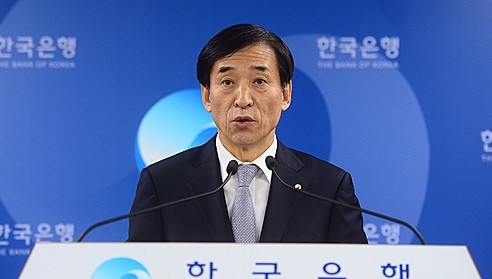
[Special Economy=Eunji Kim]The next Monetary Policy Committee that will decide on what do about Korea’s interest rate will be held next Thursday, and the country bank’s dilemma isn’t getting any lighter.
Currently, Japan is implementing a negative interest rate policy and China as well as Europe are expanding their use of quantitative easing.
Korea, for one, is experiencing economic slowdown and with that, there are more voices calling for an interest rate reduction. But, the problem is: there are roadblocks on the way.
The country’s financial market is showing volatility and foreign investors are on a trend of selling their stocks at a rapid rate.
From late last year to last mid-month, they sold over three trillion won worth of stocks.
Additionally, a jump in household debts and the U.S. interest rate hike are proving to be bearish factors in Korea’s mentioned matter.
However, putting these barriers aside, there is happening to be more favorable conditions for the decision about the possible decrease.
According to Bank of Korea’s Governor, Lee Ju-yeol, he said he will decide about the reduction based on assessing the current economic situation. That means he is calling for a “data dependent” measure.
Looking at the Ministry of Trade, Industry and Energy’s February export results, that decreased 12.2% from last year same period—the longest decline of 14 months.
This kind of slump in industrial production and consumption is putting pressure on the Bank of Korea to do a decrease. January’s entire industrial production decreased 1.2% from the month before while retail sales and equipment investment respectively fell 1.4% and 6.0%.
During last month’s Monetary Policy Committee, the Governor of Bank of Korea decided to freeze the interest rate. However, calls for a reduction—albeit that of a minority—came up in eight months and expectations for just that are becoming bigger.
“The side-effects after Japan’s implementation of its negative interest rate should be a lesson learned,” Lee has said. “When foreign factors are volatile, then the decline in our negative interest rate is not for certain.”
| 이주열 총재, 금리 인하할까 말까?…10일 금통위 주목 ↑ [스페셜경제=김은지 기자]오는 10일 기준금리를 결정할 금융통화위원회가 다가오면서 한국은행의 딜레마는 깊어지고 있다. 현재 일본은 ‘마이너스 금리’를 추진하는 중이며 중국과 유럽도 ‘완화적 통화정책’을 확산하고 있는 상태이다. 한국도 경기 둔화를 체감하면서 기준금리 인하를 위한 목소리들이 더 높아지고 있다. 문제는 금리인하 실행을 막는 걸림돌이 있다는 것이다. 한국 금융시장은 여전히 불안한 가운데 국내 주식·채권시장에서 외국인투자자들의 매도세가 이어지고 있는 상황이다. 외국인투자자들은 작년 하반기에 이어 올 들어서도 지난달 중순까지 3조원이 넘는 주식을 순매도했다. 또한 한국 가계부채 급증이나 미국 금리 인상도 악재 영향을 미친다. 하지만 걸림돌이 나타나는 형태는 잠시뿐이고 금리 인하 결정에 대한 우호적인 여건이 많아지고 있다. 한국은행 이주열 총재에 따르면 그는 금리 인하 여부를 현재 경제상황에 맞춰 결정하겠다고 밝혀왔다. 이른바 ‘데이터 디펜던트’(경제지표 의존)을 실행하겠다는 의미이다. 1일 산업통상자원부가 발표한 2월 수출 실적은 전년 동기보다 12.2% 하락해 역대 최장기간인 14개월 연속 감소행진을 해왔다. 이런 부진한 산업생산과 소비도 한은의 금리 인하 결정에 압박을 주는 것이다. 1월 전체 산업생산은 전월보다 1.2% 감소했고 소매판매는 1.4%, 설비투자는 6.0% 줄었다. 지난달 금통위에서 이 총재는 기준금리를 동결하겠다고 결정했다. 하지만 금리 인하를 주장하는 소수의견이 8개월 만에 제기되면서 인하 기대가 확산되고 있다. 이 총재는 지난달 금통위 기자회견에서 “"일본 마이너스 금리 도입 이후 나타난 부작용은 우리가 참고해야 할 교훈이고 대외여건이 불안정할 때 금리 인하의 기대 효과는 확실치 않다”고 신중한 입장을 밝혔다. |

